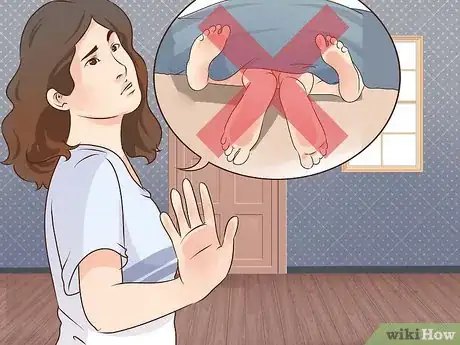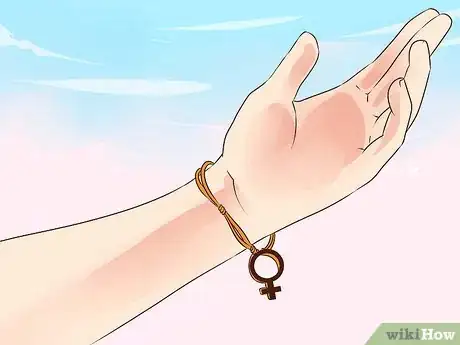This article was co-authored by Trudi Griffin, LPC, MS. Trudi Griffin is a Licensed Professional Counselor in Wisconsin specializing in Addictions and Mental Health. She provides therapy to people who struggle with addictions, mental health, and trauma in community health settings and private practice. She received her MS in Clinical Mental Health Counseling from Marquette University in 2011.
There are 8 references cited in this article, which can be found at the bottom of the page.
This article has been viewed 115,461 times.
There may come a time when your boyfriend or girlfriend starts discussing the idea of having sex. Not everyone feels comfortable or ready for sex at the same time in their lives, and it's completely normal to want to wait. Though you may feel nervous about saying "No," it is totally fine to tell your partner you want to wait. Preparing yourself to let your partner know that you are not ready for sex can help you feel confident when discussing this issue.
Steps
Being Confident In Your Choice
-
1Don't confuse love and sex. Sex and love are two separate, complicated issues that often get confused for being the same thing. You and your partner can be in a loving relationship without having sex. Sex does not need to be involved in order to prove or validate your love. Understanding that sex and love are two separate issues can help you feel confident in saying no to sex if you don't feel ready for it.[1]
- Simply dating a person does not mean you should feel pressured to have sex.[2]
- A loving partner will understand your choice to wait for sex and won't pressure you into it.
-
2Say "No" whenever you choose. Some teens might have already had sex with their partner and may feel that they can no longer say "No" in the future. You should understand that you can say no to sex — or other sexual activity — at any time. Even if you have already had sex, either with a former partner or your current partner, you can still say no at any point.[3]
- Having sex in the past does not require you to say “Yes” in the future. If you had sex with a previous partner, it does not mean you should be expected to have sex with your current partner.
Advertisement -
3Practice saying “No.” If you are feeling nervous or unsure about saying “No” to sex, you may want to practice. Practicing saying “No” in a way that you feel comfortable with can help make it easier for you to say it when the issue presents itself. Think about how you want to say “No” and then say it out-loud a few times. This can help you get familiar with how it feels to say “No” and allow you to make your position clear in a way that is right for you.[4] [5]
- Think about how you would feel comfortable saying no.
- You can say “No” as simply or as detailed as you would like.
- You don't need to explain yourself or offer excuses. Saying “No” is enough.[6]
- Practice statements like, “No, I don't want to have sex,” or, “I'm not ready to have sex.”
-
4Think about your reasons. You may not fully understand exactly why you don't want to have sex. This is fine; you don't need to have reasons or explain your stance. However, understanding why you might want to avoid sex can help you be more confident in that decision. Take a look at some of the following reasons why you might want to wait before having sex:[7]
- You don't feel comfortable or ready to have sex.
- You understand the risks of pregnancy and what that would mean for your future.
- You know that contracting a sexually transmitted infection is a risk.
- You might worry about how you will feel after.
- You don't want to feel pressured into having sex.
- You just know it's not the right time.
- It conflicts with your religious beliefs.
Talking To Your Partner
-
1Talk with your partner. Talking with your partner and expressing how you feel is the best way to let your partner know that you are not ready to have sex. A truly caring partner will listen to your concerns and respect your wishes and how you feel. If you are uncomfortable with having sex, the only way your partner is going to know about your discomfort is if you tell your partner that you are not ready or don't want to. If you feel uncomfortable expressing this to your partner, you can seek out counseling from your school counselor. You can also seek advice from your parents.[8] [9]
- A good partner will be open to hearing your feelings and thoughts regarding sex.
- If your partner doesn't want to listen to your stance on sex, you may need to reevaluate your relationship.
-
2Don't give in to pressure. Your partner may try to convince you that having sex is the best option and it's something you should want. Avoid giving into anything she might say or do, standing firm in your choice to not have sex. When it comes to having sex, always listen to your own thoughts and feelings first. If you are not comfortable with having sex, then you need to honor your feelings.[10]
- Although you may care for your partner's needs, never compromise your own to meet hers.
- Being pressured into having sex can be a sign that your partner doesn't respect your own needs.
- You don't need to prove your love to your partner by having sex with her. In fact, having sex won't likely prove anything at all.[11]
-
3Make yourself clear. Setting clear boundaries with what you are and are not comfortable with can go a long way in avoiding future issues. Talk with your partner and let him know what is acceptable and what isn't. Making your boundaries clear can help you and your partner feel more comfortable and have a better relationship.[12]
- Be aware, too, that it's okay if you're not entirely sure of your boundaries. Just communicate this to your partner and if your partner does something you aren't comfortable with, tell him to stop.
- Be as clear as possible with your boundaries.
- Never accept your partner pushing or trying to go beyond your boundaries.
- It's okay to change your mind. If you are doing something and decide you're not comfortable with it or you don't want to do it anymore, you can tell your partner to stop.
-
4Break up if necessary. It may be the case that your partner isn't listening to you when you say that you aren't ready for sex. She may try to continue pressuring you into sex or continue bringing it up. A partner who isn't respecting your needs, feelings, and concerns might not be such a great partner after all. The relationship might have to end if your partner isn't listening when you say “no” to sex.[13]
- Your relationship may be unhealthy if your partner won't respect your decision to not have sex.
- Your own values and needs are more important than the relationship continuing.
- You deserve someone who will respect your choice when it comes to not having sex.
-
5Think about responses. There are a few common ideas that your partner may use to try and convince you to have sex. These ideas can range from comparing your relationship to others all the way up to emotional blackmail. Knowing how to respond to these tactics can help you be prepared and stand strong in your decision to abstain from having sex. Take a look at the following sample dialogue to learn some of the more common persuasion tactics:[14] [15]
- ”If you really loved me, you'd have sex with me.” This is emotional blackmail and is a serious sign of disrespect from your partner. You might reply by saying “If you really loved me, you'd respect my choice to not have sex.”
- ”If you don't have sex with me, someone else will.” A statement like this reveals that your partner cares more about sex than he does for you. You might say “I'm sorry you feel that way. I hope you find someone else then.”
- ”Everyone else is having sex.” Many teens are actually not having sex, choosing to wait until later in life.[16] You might reply with “Well, our relationship isn't everyone else's. I'm going to do what's right for me.”
Staying True To Yourself
-
1Go on group dates. Going on group dates can be a great way to enjoy your partner's company and reduce the chances of sexual pressure coming up. You, your date, and your friends can all enjoy a fun evening together and keep the focus off of anything sexual. If you're trying to avoid any difficult situations, try bringing other couples or friends along on your dates.[17]
- Try going on dates with another couple or in a larger group.
- Avoid being alone together. Don't leave public spaces or your friends.
-
2Don't drink or use drugs. If you are trying to avoid situations where you might be pressured into having sex, you will need to have a clear head. Drinking alcohol or taking certain drugs can have an effect on your thoughts and your feelings towards sex. You may be more likely to engage in sexual behavior if you have been drinking or using other substances. Stay sober on your dates to avoid making choices that you may later regret.[18]
-
3Wear a reminder. Some people find it helpful to wear a token or some kind of reminder of their dedication to not having sex. These can help you stay focused on your choice, even if you encounter a situation where sex might seem tempting. If you want to avoid having sex, try wearing something that reminds you of your decision and commitment.[19]
- You might wear jewelry, such as a necklace, ring, or bracelet that serves as a reminder of your choice to not have sex.
- Make sure your reminder is something simple and easy to wear.
-
4Surround yourself with good friends. Your friends will often have a large influence on your choices, thoughts, and actions. Having good friends who support your choice to not have sex can help you to keep your commitment. For extra support, try talking with your friends and sharing your choice to say "no" to sex.[20]
- Your friends can help you to stick to your decision.
- Try talking with friends who share the same goal to help support each other.
- Avoid talking with friends who try to convince you to give up or compromise your choice to say "no" to sex.
References
- ↑ http://www.realalternatives.org/worried/sayingno.htm
- ↑ http://childdevelopmentinfo.com/ages-stages/teenager-adolescent-development-parenting/teen-dating-sex/
- ↑ http://childdevelopmentinfo.com/ages-stages/teenager-adolescent-development-parenting/teen-dating-sex/
- ↑ http://www.pediatricsafety.net/2016/01/teen-sex-tips-say-no/
- ↑ http://www.familycircle.com/teen/parenting/sex-talk/say-no-to-sex/
- ↑ http://b4udecide.ie/your-decision/saying-no-to-sex/
- ↑ https://www.psychologytoday.com/blog/you-and-your-adolescent/201102/talking-your-teen-about-sex
- ↑ http://www.realalternatives.org/worried/sayingno.htm
- ↑ http://stayteen.org/sex-ed/article/saying-no-no-problem
- ↑ http://www.pediatricsafety.net/2016/01/teen-sex-tips-say-no/
- ↑ https://www.psychologytoday.com/blog/you-and-your-adolescent/201102/talking-your-teen-about-sex
- ↑ http://childdevelopmentinfo.com/ages-stages/teenager-adolescent-development-parenting/teen-dating-sex/
- ↑ http://www.realalternatives.org/worried/sayingno.htm
- ↑ http://www.realalternatives.org/worried/sayingno.htm
- ↑ http://www.familycircle.com/teen/parenting/sex-talk/say-no-to-sex/
- ↑ http://www.realalternatives.org/worried/sayingno.htm
- ↑ http://www.realalternatives.org/worried/sayingno.htm
- ↑ http://www.realalternatives.org/worried/sayingno.htm
- ↑ https://www.teenhelp.com/teen-sexuality/benefits-of-teen-abstinence/
- ↑ https://www.teenhelp.com/teen-sexuality/benefits-of-teen-abstinence/














-Step-16.webp)





-Step-10.webp)
-Step-20.webp)














-Step-16.webp)





































Medical Disclaimer
The content of this article is not intended to be a substitute for professional medical advice, examination, diagnosis, or treatment. You should always contact your doctor or other qualified healthcare professional before starting, changing, or stopping any kind of health treatment.
Read More...